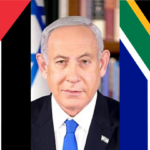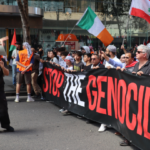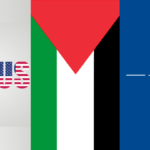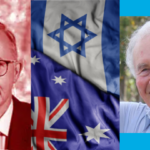Australia Is Obliged to Investigate Citizens Fighting for Israel, Says the ACIJ’s Rawan Arraf
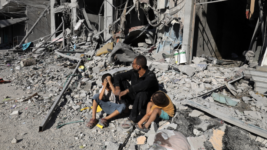
Within days of Israel commencing its now ten-month-long killing spree of the Palestinians within the walled-in region of Gaza, that nation’s PM Benjamin Netanyahu put out a call for its 360,000 army reservists to show up for duty, and that entailed around 1,000 Australians with dual citizenship.
Yet, even though war crimes and the concept of genocide were being discussed at the highest levels in Canberra within days of the Israeli assault on Gaza in early October, the government failed to address Australians heading over to the slaughter and the media simply painted them as heroes.
The Australian Centre for International Justice, however, penned a letter addressed to the home affairs minister, the attorney general and the AFP commissioner in December, outlining that citizens fighting with the Israeli military is highly problematic due to its history of international law violations.
Signed by ACIJ executive director Rawan Arraf, the letter stressed that our nation has failed to adequately warn those partaking in Gaza as to the criminal consequences they may face, as well as to advise that Australia has an obligation to investigate these people in regard to war crimes.
Yet, last week, The Guardian reported that the Australian Border Force had intervened to ask three Australian nationals travelling to Israel, as to whether they planned to take part in the Israeli military action in Gaza.
The article further noted that the Australian government had warned Australians about the consequences of partaking in the fighting in Gaza, in advising them “to carefully consider their legal obligations and ensure their conduct does not constitute a criminal offence”.
This vague warning, however, fails to mention that our nation ratified the Rome Statute in 2002, and since then, the core international crimes of genocide, war crimes and crimes against humanity appear domestically in the Criminal Code Act 1995 (Cth), and do apply to crimes committed in Gaza.
Sydney Criminal Lawyers spoke to Australian Centre for International Justice executive director Rawan Arraf about the government’s oversight in failing to adequately address this issue in any way, that this nation’s failure to deal with war crimes is habitual and how universal jurisdiction works.
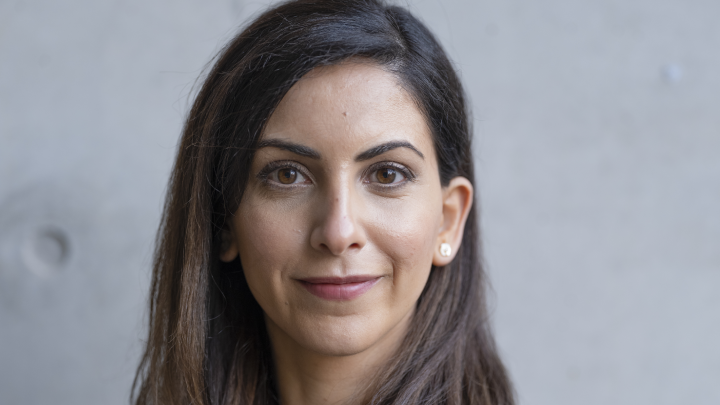
Rawan, The Guardian recently reported on the ABF having scrutinised several Australians as to whether they were leaving the country to take part in the Israeli military action in Gaza, and the article added that the government had been warning such people about falling foul of the law.
This report appears to be in response to the issue being raised by the Australian Centre for International Justice and other concerned parties regarding how the government is responding to Australians citizens partaking in the assault on Gaza.
Yet, the Australian Centre for International Justice first raised these points with the government in December.
So, how do you consider the government should have and has been acting on this issue?
While it’s true that The Guardian reported that the government had warned the individuals, there is no way those warnings are sufficient.
Those warnings were just responses from the attorney general and the foreign minister to two separate petitions posted on the Australian parliament website
The question really is, how do we know that this supposed warning has been conveyed to the people concerned: those leaving to fight in the Israeli military? And further how is this actually a public statement and in what way was there an actual warning in what was said?
I’m concerned that the reported message is insufficient. And while it’s a welcome step, the government needs to be doing much more to ensure that any such warning is relayed effectively and publicly.
The warning should also outline what potential offences these individuals could be investigated and prosecuted for.
But if we compare the two responses, the petitions themselves are different, one is detailed and the other not so much.
Foreign minister Penny Wong’s response conflates issues to do with foreign fighters, which that specific petition didn’t raise. She neglected and outright ignored the petition and instead, sought to confuse the issue by raising foreign fighters, which was not relevant at all in this circumstance.
The second issue here is that we wrote to various ministers in a letter in December, which we published online and have not received any response from government in relation to.
The letter was putting the government on notice in relation to the real concern that Australian citizens are involved in the Israeli military and are likely committing international crimes.
The ACIJ letter was sent out in December, yet the ICJ’s ruling that Israel is plausibly perpetrating a genocide in Gaza wasn’t made until late January, so how could the ACIJ be making these assertions around international crimes before that finding?
Credible evidence of Israel’s litany of international crimes – war crimes, crimes against humanity – have been on display for decades.
So, we don’t need an ICJ ruling on the plausibility of genocide occurring in Gaza, as a result of the 7 October attacks, to raise concerns about the Israeli military and its criminal conduct.
There are copious amounts of information relating to this from UN bodies, international human rights NGOs and Palestinian NGOs and even Israeli NGOs, which have documented countless violations of international law, amounting to international crimes committed by the Israeli military.
That’s the reason why we can make those assertions, and really this issue should have been scrutinised long before the 7 October, because, as horrific as those acts were, they did not occur in a vacuum. Palestinians have been subjected to Israeli oppression for decades.
When this issue was first raised the commentary was about dual citizens of Australia and Israel travelling to join the fighting.
However, the recent Guardian article only mentions three Australians being stopped at the border and questioned, which could suggest these people didn’t possess Israeli citizenship as well.
I’d say the majority of those who have travelled to Israel to fight would be dual citizens. And that is because through our research we’ve identified these individuals are Australians and Israelis, most of whom were already reservists.
But that doesn’t discount the fact that there may be Australian citizens, who have no Israeli citizenship but have volunteered in the Israeli military.
Certainly, one report from the Sydney Morning Herald in 2017, which we referenced in our letter to the government, indicated that there may be individuals volunteering, as there is a program for non-Israeli nationals to volunteer called, Mahal. And it is probably the case that there are Australian citizens who aren’t citizens of Israel but have volunteered for the Israeli military in Mahal.
But the likelihood is the majority of these people are dual citizens.
There is also the separate issue of Israelis, who are entering Australia on any type of visa, who have served in the Israeli military and are being issued with visas to enter Australia. They’ve potentially served in brigades that have been involved in serious crimes in the West Bank or Gaza.
So, what is the government doing in terms of these people issued with visas entering Australia, whether that be a tourist visa or a work visa, because there should be automatic questions raised about their military backgrounds and whether those backgrounds raise concerns about criminal activity?
The ACIJ hasn’t solely raised warning Australian citizens about potential criminal sanctions, but from the beginning it’s been talking about an obligation on the part of the Australian authorities to investigate these individuals on return from partaking in the assault on Gaza.
Why has this point been equally, if not, the main point the ACIJ has been making over the last half year? And since the government drafted these laws, why are you warning politicians about them and their consequences?
There was clearly an uptake of individuals returning to Israel to fight. There was a directive from the Israeli government issuing an order for all reservists to go back and fight.
And there were a number of puff pieces in the mainstream media about a number of individuals who were going back to undertake their so-called duties in the Israeli military.
And it’s concerning that there is no public conversation being had about these individuals, Australian citizens, going back to engage in a war that is daily raising serious and credible allegations of international crimes, and whether these individuals would be carrying out orders to commit international crimes.
Our call is simple, such individuals should be monitored, questioned and investigated.
There should be a real attempt to gather evidence and analyse the evidence into whether or not any such individuals have been involved in international crimes and if so, then there should be prosecution of such individuals.
That is the process that is currently underway in relation to allegations of war crimes by Australians in Afghanistan, and it should be the same for any other conflict where there are allegations of crimes.
We know from public announcements in the UK, the war crimes team at the Met Police are undertaking investigations of such individuals, and people are being referred for criminal investigation.
By referred, I mean civil society organisations, like the ACIJ, have been documenting and obtaining information about individuals and referring such individuals to the Metropolitan Police for investigation.
The reason why we are calling for investigations is we need them to determine if there has been any criminal culpability and from there, for prosecutions to commence.
There has to be an investigation, you can’t just refer people without any evidence or information on their actions or the unit that they’ve been involved in.
An investigation that’s genuine has to have been commenced.
Is it incumbent on government to be doing this? Is our government required to ensure that it does investigate Australians who’ve been overseas potentially committing war crimes?
Of course, there are international obligations on Australia to investigate and prosecute the commission of international crimes.
The Australian Federal Police should be doing it and they should be doing it, regardless of whether the Australian government has prioritised such investigations. But we know the AFP isn’t interested in doing so.
Part of the broader problem that we have in Australia is there is no independent international crimes unit within the Australian legal structure, to investigate these international crimes: the offences within divisions 268 and 274 of the Criminal Code.
The ACIJ has recommended that there should be one, because we have seen that the lack of such a unit has contributed to an inability to produce proper investigations and prosecutions, along with a willingness for investigators to take on these crimes and for prosecutors to pick them up.
Long before 7 October, we were making this recommendation, as it does not relate to one specific issue but rather a broader structural issue to do with inability to investigate international crime offences, because there is no specialised international crimes unit in Australia.
This is compared to other jurisdictions where we have seen universal jurisdiction cases and more broadly, international crime investigations and prosecutions commence and have done so successfully, and it is always because of the presence of special war crimes unit taking the lead.
That’s the reason we have not seen any successful prosecutions in Australia, because there has been no investigative body that has actively been able to investigate these crimes.
One clear example is Australian war crimes allegations in Afghanistan. Had we had a functioning unit within the AFP, we wouldn’t have had inquiry after inquiry that then led to the establishment of the Office of the Special Investigator that has powers to investigate and refer cases for criminal prosecution.
The fact that the Australian government needed to set up such a unit is a tacit recognition that the AFP couldn’t do it on their own. That is why we need a permanent unit. The problem with the OSI is it is an ad hoc unit, and its remit is to investigate war crimes in Afghanistan during a specific period.
So, we can’t take any referrals of any other investigation to the OSI.
We have to take them to the AFP because the AFP is the body currently mandated to investigate federal crimes.
So, you would say if a special war crimes unit was operating before Afghanistan, that unit would still be actively monitoring what was going on and you wouldn’t have to rely on someone like David McBride to come along and blow the whistle on things for this to be addressed.
David McBride or anyone like him, would ideally have gone to the AFP. And by the way, there were complaints that were sent to the AFP. But the AFP ultimately failed in investigating those complaints.
It is a clear example of the need for a specialised investigative unit.
The AFP should take a better approach at investigating international crime offences and that is because Australia has on obligation to.
But not only that, it’s got an opportunity to be a leader in the region. But there is no concerted effort at international crimes investigations and prosecutions.
And we have a problem in the region in that perpetrators may think Australia is a safe haven, and they can come in and out without proper scrutiny.
And that’s been the case in the past in Australia.
Exactly. We highlighted the case of the Sri Lankan general Jagath Jayasuriya, who was allowed into Australia several times, at least twice that we know of.
We alerted the AFP. We sent a criminal complaint, and it wasn’t appropriately dealt with. So, Jayasuriya was allowed to enjoy impunity, and he still does, and the majority of the perpetrators in relation to the war in Sri Lanka have continued to evade accountability.
What I mean is there is a legal obligation for Australia to investigate and prosecute, but more so, it should be incumbent on us to lead in our region and ensure that Australia is not a safe haven for perpetrators of international crimes.
This approach you’re talking about, you’ve referred to as the universal jurisdiction strategy. The ACIJ is in touch with international organisations working solely in this jurisdiction.
Can you elaborate upon what the universal jurisdiction strategy is?
Universal jurisdiction is a term that essentially means there is availability or jurisdiction in the law to investigate and prosecute individuals who have committed international crime offences, which are found in our Criminal Code and which are essentially, Rome Statute offences.
These are the offences of war crimes, crimes against humanity and genocide. But also, there is the crime of torture in division 274.
These are the international crimes as we define them at ACIJ. Such individuals can be investigated and prosecuted, regardless of their nationality, regardless of the territory on which the crime took place and regardless of the nationality of the victim.
Australia has pure or absolute jurisdiction. But this law is not being utilised properly because of structural inadequacies and lack of government willingness to make it a priority to pursue accountability and ending impunity of international crimes, wherever they occur.
What I mean by strategy is that we are using these tools to try and seek accountability for the partners and communities we work with.
Universal jurisdiction is a very different endeavour, however, than usual criminal investigations. These cases take years to build and to see to fruition and finalisation. You have to work closely with communities of impacted people, and you need to be strategic about your approach.
There is a lot that goes into case selection, trying to find the available evidence and how best to engage with the authorities to point them in the right direction.
We’re a new legal centre. We’ve been around for five years. Our colleagues abroad have had success and have been around for much longer. Every jurisdiction is unique and needs to engage in its specific context, and we are developing our own strategies.
In Australia, it is often considered that the issue of the attorney general’s consent is the biggest hurdle to overcome, but we don’t think that’s always the case. We can’t even get to that point of the attorney general considering whether to give their approval, without an investigation that has commenced.
So, we concentrate on developing serious criminal complaints and submissions to the authorities, the AFP, to compel them to investigate.
It’s not illegal for an Australian citizen to go and fight with the armed forces of a foreign nation.
However, in the comments section of the articles relating to this issue, individuals continue to point to the fact that the Abbott government brought in its foreign fighter laws, which continue to prevent fighting with militant groups overseas.
But these individuals consider there is something amiss here when the foreign fighter laws forbid participating in atrocities with nonstate actors, yet don’t forbid fighting in the military of a nation that has just been ruled to be plausibly committing genocide.
How do you respond to these points?
I understand the underlying sentiment of such comments which are essentially pointing to a hypocrisy and double standard in the government’s approach to, at least in this example, individuals who are fighting in the Israeli military.
There is no scrutiny. There is no call for these people to be investigated given there are serious allegations of international crimes. And this is what people are really frustrated with: the hypocrisy and double standards.
And I would say those comments are fair and should be heard even if the legal issues are a little distinct.
Another issue here is that the government likes to make a point about social cohesion. And that’s fair.
But in neglecting or ignoring this issue, somewhat deliberately, they’re ignoring the fact that we could potentially have individuals who went and served in Gaza coming back to Australian shores having committed serious international crimes.
So, what does that say about social cohesion, with such individuals walking around with impunity?
That is the bigger issue regarding social cohesion and the government needs to address it.
You can imagine scenarios of the risk of violence, for example, where such individuals return and boast about having served in Gaza.
Politicians are quick to vilify the Palestinian solidarity protests, but they are deliberately silent about the fact that Australians are going to fight a genocidal war, in an occupation force, imposing starvation and apartheid policies, and they’re coming back here with full impunity, and no one is doing anything about them.
The risk that these people could cause violence, that’s the real concern in relation to social cohesion. If they’re serious about social cohesion this should be one of their top priorities.
So, from what you’ve just said, if the government was preparing to enforce the Rome Statute offences that are on the books, then that would be somewhat equivalent to enforcing foreign fighter laws in other circumstances?
I agree with that.
And lastly, Rawan, the ACIJ has identified 20 Australian citizens who’ve returned from partaking in the assault on Gaza. It’s passing this information onto the AFP.
But more broadly, you’ve been advocating for these approaches for over half a year now, so is the campaign making gains, and how do you expect the process that the ACIJ is currently engaged in will progress from here?
Finding out information about potential individuals involved, linking them to their units and then looking at or analysing any such potential activity from those units in Gaza at the particular time that those individuals were serving, does take time.
And we want to do this properly, because it’s an important and serious endeavour. We’re trying to do the first part of the investigation to encourage and compel investigators to take it up.
Ideally, we shouldn’t be doing it at all. Ideally, you would have a specialised unit that was concerned and doing everything we are doing to try and find out the initial information about individuals.
They have the investigative powers to gather evidence, ask people questions, to make those inquiries and start investigations.
That is a time-consuming undertaking, and we are conducting it with our partner organisations in Palestine and we aren’t taking a hurried approach. We are going to undertake it properly and do it as best as we can.
We are committed to engaging with Australian authorities in a serious way so that they do undertake their obligations to investigate.
And where does it go to from here? Well, one of the concerning things is the lack of interest from the mainstream media, other than the recent Guardian piece, there has been no publication or interest in the issue.
After 7 October, there were these puff pieces about how these individuals going back to fight, and what really struck me was that none of these pieces, whether they’re in the Sydney Morning Herald or the Herald Sun or The Australian, none of them thought to question the concern that these people are fighting in an army that is credibly committing international crimes, enforcing an illegal occupation and an apartheid regime.
We have not seen any attempt by the Australian mainstream media to really interrogate the issue of Australians going to serve in the Israeli military.


